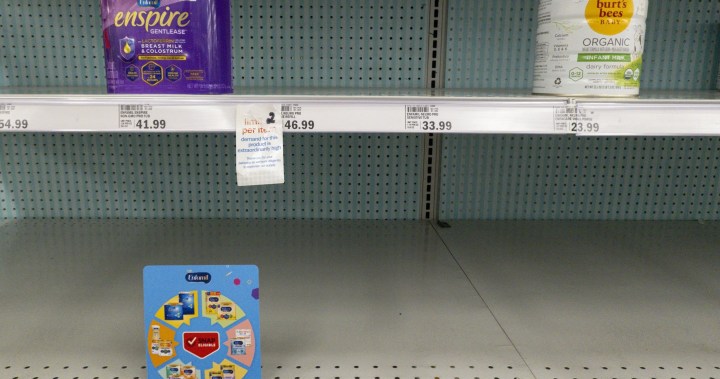
Deadly germ behind baby formula shortage added to CDC watchlist
Global News
U.S. health officials will start tracking infections caused by the rare but potentially deadly germ that sickened babies and triggered a nationwide shortage of infant formula.
U.S. health officials will start formally tracking infections caused by the rare but potentially deadly germ that sickened babies and triggered a nationwide shortage of infant formula last year.
A group that advises the Centers for Disease Control and Prevention agreed Thursday to add infections caused by cronobacter to the list of serious conditions reported to the agency. There are about 120 infections and diseases on the national watchlist.
States will be asked, but not required, to notify the CDC about cronobacter infections, although they usually comply. Such infections are required to be reported now in only two states, Minnesota and Michigan. The change will take effect next year, though states may begin reporting earlier.
The action by the Council of State and Territorial Epidemiologists, a nonprofit group, caps months of demands from experts and food safety advocates who called for better surveillance of the deadly infections that typically strike the most vulnerable babies. The move establishes standard criteria for identifying and counting probable and confirmed cronobacter cases and recommends that states require them to be reported.
Cronobacter is a type of bacteria found widely in the environment. When the bug gets into a food such as powdered formula, it can cause life-threatening bloodstream infections and meningitis in very young or ill infants.
Dr. Julia Haston, who has studied cronobacter infections at the CDC, said earlier this year that the agency has typically received reports of two to four of the invasive infections a year, rather than the 18 that are estimated to actually occur.
“Because we don’t routinely perform surveillance, we don’t know the true incidence of infection or the number of deaths per year,” she said.
Though the infections are rare, up to 40 per cent of babies who fall ill will die, Haston added.





















 Run 3 Space | Play Space Running Game
Run 3 Space | Play Space Running Game Traffic Jam 3D | Online Racing Game
Traffic Jam 3D | Online Racing Game Duck Hunt | Play Old Classic Game
Duck Hunt | Play Old Classic Game

